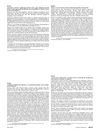 26 citations,
November 2009 in “Journal of Endocrinological Investigation”
26 citations,
November 2009 in “Journal of Endocrinological Investigation” Certain gene variations are not a major cause of male infertility in Nigerian men.
 September 2024 in “Medicina”
September 2024 in “Medicina” Certain gene variations may protect against skin issues and oxidative stress in women with PCOS.
 11 citations,
July 2001 in “APMIS. Acta pathologica, microbiologica et immunologica Scandinavica./APMIS”
11 citations,
July 2001 in “APMIS. Acta pathologica, microbiologica et immunologica Scandinavica./APMIS” Estrogens are key for bone growth spurts in both boys and girls and affect growth into adulthood.
 September 2022 in “Canadian journal of animal science”
September 2022 in “Canadian journal of animal science” Certain gene variations are linked to the thickness of cashmere goat hair.
 10 citations,
January 2019 in “Advances in Clinical and Experimental Medicine”
10 citations,
January 2019 in “Advances in Clinical and Experimental Medicine” Certain variations in the vitamin D receptor gene are linked to an increased risk of polycystic ovary syndrome.
 January 2017 in “Clinical & medical biochemistry”
January 2017 in “Clinical & medical biochemistry” Certain gene variations in AKT2 are more common in women with PCOS and are linked to higher levels of specific hormones and symptoms.
 February 2013 in “Journal of the American Academy of Dermatology”
February 2013 in “Journal of the American Academy of Dermatology” Certain gene variations might increase the risk of a hair loss condition in Koreans.
37 citations,
October 2014 in “JAMA dermatology” A woman with severe hair loss was successfully treated with the drug adalimumab.
 51 citations,
January 2012 in “Annals of Dermatology”
51 citations,
January 2012 in “Annals of Dermatology” Asian hair loss differs from Europeans; consider individual needs and psychological well-being for treatment.
 12 citations,
August 2019 in “BMC Medical Genetics”
12 citations,
August 2019 in “BMC Medical Genetics” Certain MC4R gene variants are linked to higher BMI in obese women with PCOS but do not cause PCOS.
A specific gene change in APCDD1 increases the risk of hair loss.
 August 2023 in “Sabuncuoglu Serefeddin Health Sciences”
August 2023 in “Sabuncuoglu Serefeddin Health Sciences” CT60 polymorphism might increase the risk of Alopecia Areata.
 16 citations,
December 2014 in “International Journal of Biological Markers”
16 citations,
December 2014 in “International Journal of Biological Markers” Longer CAG and GGN repeats increase alopecia risk, but no significant link to post-finasteride syndrome found.
1 citations,
January 2019 in “Journal of Research in Medical Sciences” Fewer GGC sequences in the androgen receptor gene improve finasteride treatment for hair loss.
 4 citations,
April 2019 in “Gynecological Endocrinology”
4 citations,
April 2019 in “Gynecological Endocrinology” Certain gene variations are found in people with polycystic ovary syndrome.
 93 citations,
June 2001 in “The Journal of Clinical Endocrinology and Metabolism”
93 citations,
June 2001 in “The Journal of Clinical Endocrinology and Metabolism” Certain genetic variations in the AR and ERβ genes can affect androgen levels in women.
 14 citations,
December 2016 in “Sexual Medicine”
14 citations,
December 2016 in “Sexual Medicine” Finasteride side effects in young men may be linked to specific gene variations.
17 citations,
August 2015 in “Journal of Animal Science” The MTR gene affects wool quality and production in Chinese Merino sheep.
 January 2018 in “Elsevier eBooks”
January 2018 in “Elsevier eBooks” The document explains how male reproductive hormones work and affect the body.
 36 citations,
January 2017 in “Journal of Obstetrics and Gynaecology Research”
36 citations,
January 2017 in “Journal of Obstetrics and Gynaecology Research” The review found no clear link between vitamin D receptor gene variations and polycystic ovary syndrome.
 103 citations,
March 2015 in “Nature Communications”
103 citations,
March 2015 in “Nature Communications” A genetic region near the PAX1 gene is linked to a higher risk of scoliosis in females.
 May 2008 in “Hair transplant forum international”
May 2008 in “Hair transplant forum international” A genetic test can identify people at risk of male pattern baldness early, allowing for quicker treatment.
 3 citations,
January 2018 in “Postępy Dermatologii i Alergologii”
3 citations,
January 2018 in “Postępy Dermatologii i Alergologii” Longer TA repeats in the SRD5A2 gene may increase acne risk in Chinese people.
 July 2024 in “Indian Journal of Dermatology Venereology and Leprology”
July 2024 in “Indian Journal of Dermatology Venereology and Leprology” Certain gene variations in PITX2 are linked to a higher risk of male pattern baldness in Indians.
 6 citations,
July 2013 in “Acta Clinica Belgica”
6 citations,
July 2013 in “Acta Clinica Belgica” The document concludes that combination therapy is most effective for treating excessive hair growth in women with idiopathic hirsutism, and more research is needed to understand the condition.
 47 citations,
August 2000 in “Endocrine Reviews”
47 citations,
August 2000 in “Endocrine Reviews” The document concludes that more research is needed to understand excessive hair growth in women with normal hormone levels and regular ovulation.
April 2018 in “Journal of Investigative Dermatology” Screening for the NUDT15 gene variant can prevent severe side effects from thiopurine drugs in East-Asian people.
 February 2013 in “Journal of the American Academy of Dermatology”
February 2013 in “Journal of the American Academy of Dermatology” Certain gene variations may increase the risk of alopecia, and platelet-rich plasma treatment can improve hair density in those with hair loss; a rare case of facial Becker's nevus was linked to uneven beard growth.
 7 citations,
January 2021 in “The journal of gene medicine”
7 citations,
January 2021 in “The journal of gene medicine” Certain genetic differences may affect how likely someone is to get COVID-19 and how severe it might be.
 7 citations,
October 2019 in “Clinical, Cosmetic and Investigational Dermatology”
7 citations,
October 2019 in “Clinical, Cosmetic and Investigational Dermatology” Certain gene variations in the Vitamin D receptor may increase the risk of chronic hair loss.

























